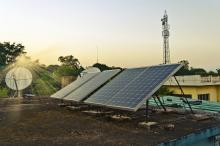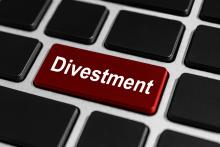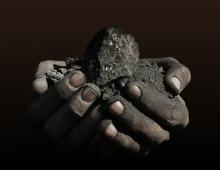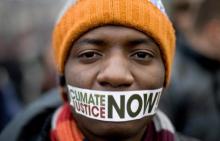fossil fuels

AS SOMEONE WHO has lived with chronic pain and come to terms with being a body with limits, I struggle to square a theology of limits with a theology of abundance.
I have limits on my time, energy, and what my body can do. I’ve made peace with and even come to appreciate God’s elegant design of bounded human bodies and an Earth with limited, depletable resources. And yet, our faith speaks of a God who can do “immeasurably more than all we ask or imagine” (Ephesians 3:20, NIV), the same God who led the Israelites into a land “flowing with milk and honey” (Exodus 3:8) and pours oil over the psalmist’s head until his cup overflows (Psalm 23:5).
In a world rapidly running out of arable land, fossil fuels, and healthy soil and water, how do we rightly interpret a theology of abundance?

TUESDAY, MARCH 21, is the day for our big national action against the giant banks that are backing the fossil fuel industry.
Why March 21? Because it’s — if you think about it — 32123, simply too good a palindrome to pass up. It’s a countdown to the end of something (our economy’s blithe support for energy sources that scientists tell us we must now forego) and a count up to the real start of a possible transition.
We’ll be out in force across the country, picketing Citibank, Chase, Bank of America, and Wells Fargo branches: Those four giants lead the world in lending to Big Oil. Their offices look like benign tenants of strip malls across America, but in truth each should have a giant smokestack coming out the top, to remind us just how much carbon they produce. (If you have $125,000 in one of these institutions, which lends it out to build pipelines and frack wells, then that money is producing more carbon in a year than all the heating, flying, driving, cooling, and cooking of an average American.)

Wrestling with the complicated legacy of Christians and international adoption.

THE CLIMATE CRISIS is a moral crisis. What else should we call the willful choice to inflict hunger, disease, and suffering on those in the poorest circumstances?
At the same time, the climate crisis is an opportunity to allow God’s healing grace to enter our lives. As with every great failure of our collective conscience, the way forward begins with each of us standing up in faith and love to right the wrongs of the past. Around the world, faith communities are doing just that. As national governments fail to show the decisive and visionary leadership we need, faith communities are taking up the mantle of justice. Under the banner of the U.N.’s “race to zero” initiative, many faith communities are committing to meaningful changes in the way they operate to build a healthy, safe world that protects everyone.
It’s hard work, but it is the way of the future. In 50 years, the Earth’s fossil fuels will be depleted, and the world will no longer run on oil and gas. The only questions are how quickly we can make this change and whether we can make it well. Many faith institutions have chosen to put their pocketbooks to greater service by divesting from fossil fuel companies and reinvesting in clean renewable energy. To date, nearly 400 faith-based institutions have divested, constituting the single largest source of commitments in the global divestment movement. Committed institutions range from huge international networks to small communities of women religious, around the globe. It’s a big movement that is successfully pressuring oil companies to think beyond the status quo.

The years ahead of us will be the most challenging our species has ever faced. For many of the other species that share this planet with us — and for some of our own people — it will be too much to survive. Dressing for a funeral doesn’t begin to prepare our hearts for this kind of devastation.

THOSE OF US who work on global warming are well-defended against even moderate optimism. Every day brings another study showing how far we’ve pushed the planet’s physical systems. For instance, new research has emerged showing that even as the planet is setting remarkable temperature records, the meltwater pouring off Greenland has cooled a patch of the North Atlantic and perhaps begun to play havoc with the Gulf Stream. Simultaneously, new research showed that the soupy hot ocean everywhere else was triggering the third planet-wide bleaching of coral in the last 15 years. It is entirely possible we’ve set in motion forces that can’t be controlled.
That said, for the first time in the quarter-century history of global warming there’s room for at least some hope in the arena we can control: the desperate political and economic fight to slow the release of yet more carbon into the atmosphere. It’s not like we’re winning—but we’re not losing the way we used to. Something new is happening.
Consider where we were six years ago, as the Copenhagen conference, much ballyhooed and long anticipated, ground to its dreary conclusion: The world had decisively decided not to decide a thing. There was no treaty, no agreement, no targets, no timetables. In fact, the only real achievement of the whole debacle was to drive home to those who cared about the climate that a new approach was needed. Twenty years of expert panels and scientific reports and top-level negotiations had reached a consensus that the planet was dangerously overheating. And it had also reached a dead end.
There was a reason for that, or so some of us decided: The fossil fuel industry simply had too much power. The fact that they were the richest industry in the planet’s history was giving them total power. They’d lost the argument but won the fight.
And because the rest of us were still arguing, not fighting, there was no real pressure. World leaders could go home from Copenhagen without fearing any fallout from their failure. Barack Obama came back to D.C. where he watched mutely as the Senate punted on climate legislation, and then mostly ignored the issue for three years, not even bothering to talk about it during his re-election campaign.

ONE OF THE most destabilizing facts of the last five years is this: The price of a solar panel has fallen 75 percent. The engineers have done their job, and that offers many possibilities.
We usually look at what the developed countries are doing with renewable energy, such as the fact that there were days during summer 2014 when Germany was generating three quarters of its power from solar panels (Germany!). But the most amazing miracles—and it doesn’t really stretch the word “miracle”—are happening in the poorest places, where for the very first time lights are blazing on.
Take rural Bangladesh, where fossil fuel has barely penetrated in the 200 years of its ascendancy in the West. There’s no grid—at night it just goes dark. Until the last few years, when low-cost solar panels and innovative financing arranged by groups such as the Grameen Bank have allowed the very rapid spread of solar panels. How rapid? As many as 80,000 new connections a month, which is far more than in the United States. Fifteen million Bangladeshis live in solar-powered houses already, and the government is hoping to have the entire nation hooked up by 2020.

LAST SPRING, Archbishop Desmond Tutu, an architect of the South African freedom movement, called for “an apartheid-style boycott to save the planet.” Tutu—along with millions of people of faith and conscience—understands not only that it is morally right to address climate change, but that money talks. “People of conscience need to break their ties with corporations financing the injustice of climate change,” said Tutu.
The fossil-fuel divestment movement has its roots in grassroots mobilizing, churches, local governments, and student campaigns. The movement has grown exponentially in the U.S. since Maine’s Unity College became the first campus to divest (in 2012) and the United Church of Christ became the first denomination to formally divest (in 2013). Today, divestment from fossil fuels is gaining momentum, with increasing numbers of asset owners committing to moving their money.
In fact, this campaign has grown faster than any other previous divestment movements, including those against apartheid in South Africa and tobacco. A number of factors indicate that we are at a tipping point. Here are four: 1) last year was the hottest year on record, 2) expenses related to climate change are skyrocketing, 3) significant financial risks are now associated with fossil-fuel investments and the divestment movement is growing, 4) and the economics of renewable energy products is improving, so investments in these products is growing.

By now, you may have heard that Jim Wallis and Sojourners have stopped funding climate change by divesting from fossil fuels. Unfortunately, for millions of Christians who invest at faith-based financial institutions, fossil-free investing just isn’t an option.
We’ve done our research. Of the 13 major Christian investment companies we studied, not a single one offers a way for their members to opt out of fossil fuels. We think Christian investment companies should be the FIRST to stop funding climate change! Read our open letter and sign below.

I HAVE SOMETIMES been dismayed by the lack of speed that some churches and denominations have shown when it came to tackling environmental issues. On the question of divestment from fossil fuels, for instance, the Unitarians have been forthrightly in favor, and the United Church of Christ as well (and the Rockefellers!). But the Methodists, Lutherans, Presbyterians, and Anglicans are, by and large, dragging their feet as usual.
Sometimes I confess to imagining that God herself might be getting a bit impatient, too—how else to explain the name of the site for the next great fossil-fuel battle?
It will happen in Australia’s Galilee Valley, a remote basin many hours from the continent’s cities. At the moment it’s basically untouched, but plans call for it to become The Biggest Coal Mine on Earth. There is enough coal beneath its soil to provide 6 percent of the carbon that would take us past the two-degree rise in temperature scientists have given as the ultimate red line. That is to say, one valley in one nation (a nation with one-third of 1 percent of the planet’s population) can do 6 percent of the job of wrecking the planet. One valley!

We’re a few weeks into 2015, which means many of us are striving to keep our New Year’s resolutions while others have already seen their best intentions collapse under the pressure of daily routines. Every year, we make promises to be better — we’ll go to the gym, save more money, slow down. But for Christians, every day is an opportunity to make resolutions. We call that repentance.
And this year — today — I am repenting of my dependence on fossil fuels.
While many associate repentance with sorrow or guilt, the biblical meaning of the word is to stop, turn around and go in a whole new direction. Repentance means changing our course and embarking on a new path.
For Christians, humanity’s failure to care for God’s creation warrants our repentance. This is not just a theological claim but a practical moral imperative when it comes to fossil fuel consumption. American Christians need to repent — and quickly!
Our society’s addiction to fossil fuels has had an unconscionable impact on the state of our Earth and on future generations. Coal-fired power plants are giving people cancer and asthma. Oil pipelines are spilling and destroying sacred lands. Natural gas fracking waste is leaking underground, threatening water sources. Through our consumption of coal, oil, and gas, we have enabled this toxic activity.

Editor’s Note : This is the first post in a new series about fossil fuel divestment and clean energy reinvestment. We’ll look at how and why people of faith might choose to divest from fossil fuels as a response to climate change.
When you really care about something, it’s important not to give up hope.
If one of the things you care about is climate change and the harm we are doing to God’s beautiful world, it’s pretty hard to keep the hope alive.
After all, the world’s leading peer-reviewed scientific authority on climate change, the Intergovernmental Panel on Climate Change, just released its most damning report ever, declaring that climate disruption is at this point “irreversible.”
And then let’s look at Congress. The United States has emitted more greenhouse gases than any other country in the world, and yet it’s been five years since Congress came anywhere near passing a major climate law. (And they failed to pass that Cap & Trade law). After the most recent election last week, Sen. James Inhofe (R-OK) — who once called global warming “the greatest hoax ever perpetrated on the American people” — is set to become the gatekeeper for all climate legislation.
This should come as no surprise. Fossil fuels – the main driver of our nation’s climate culpability – are a big business. We blow up mountains to get more coal, set up dangerous oilrigs in the Gulf of Mexico, pipe tar through the breadbasket of America, and use California’s limited water supply to hydrofrack for gas. When I say “we,” I mean the fossil fuel industry. The industry spends tons of money each year propping up climate deniers, spreading misinformation, and sowing seeds of doubt about what we are doing to God’s earth. They also fund political candidates on both sides of the aisle, buying silence from elected officials whose constituents are suffering from air and water pollution, historic drought, or stronger hurricanes.
In the face of all this, I have hope — for two reasons.

The Supreme Court’s Citizen’s United case infamously affirmed money spent in political campaigns as a form of free speech, thus declaring various legal limitations unconstitutional. The ruling gives a political megaphone to those with the most money and has been decried by many as contributing further to the nation’s political dysfunction and rigid polarization. I strongly agree.
But this ruling came to mind again when I heard the news that the World Council of Churches, at its Central Committee meeting in early July, had made a decision not to invest in fossil fuel industries. In fact, money does talk. Where institutions place their invested funds is not a neutral, pragmatic matter. It speaks volumes.

Worried about global warming, a growing number of churches and other faith groups are divesting their holdings in fossil fuel companies, which release large amounts of carbon dioxide and other greenhouse gases into the atmosphere.
“The warning in Scripture that ‘the wages of sin is death’ could not be more literally true than it is in the case of fossil fuels,” said Serene Jones, president of New York’s Union Theological Seminary, whose board voted in June to divest its $108.4 million endowment from fossil fuel companies.
“While we realize that our endowment alone will hardly cause the fossil fuel giants to miss even half a heartbeat, as a seminary dedicated to social justice we have a critical call to live out our values in the world. Climate change poses a catastrophic threat, and as stewards of God’s creation we simply must act.”
THE NEWS IN mid-May was grim: Scientists announced that melt across the West Antarctic was proceeding much faster than before. In fact, they said that at this point the melt of the six great glaciers fronting Amundsen Bay was “unstoppable,” and that over a number of decades it would raise sea levels by 10 feet or more.
This is another way of saying: Given dominion over the earth, we’ve failed. We’ve taken one after another of the planet’s great physical features and wrecked them. The Arctic? Summer sea ice is reduced by 80 percent, and it’s an every-year affair now to boat through the Northwest Passage, impassably choked by ice until this millennium began. The seven seas? Thirty percent more acidic than they were in the past—and the acidity could double or triple by the end of the century. The Antarctic? It’s not just warming rapidly, but its wind patterns have been changed by the ozone hole in ways that amplify the heating. Storms are stormier, droughts are deeper, fires last longer, rain falls harder.
And all because it was a little easier and a little cheaper not to change off fossil fuels. When scientists sounded the alarm about all this in the late 1980s, the atmospheric concentration of carbon dioxide was about 350 parts per million—or what we now consider the upper bound of safety. If we’d heeded their fervent warnings, we’d have moved with great speed to convert to solar and wind power. We’d have parked our SUVs. We’d have insulated every home in the world. It would have cost money and it would have been inconvenient; on the other hand, it could have bred solidarity in much the same way that preparing for World War II transformed the U.S.
Another Christian school moves to divest – this time, a Catholic university
Just one week after Serene Jones, President of Union Theological Seminary, announced their decision to become the world’s first seminary to divest from fossil fuels, another first announced. The University of Dayton, a Catholic, Marianist university, will divest fossil fuels from its $670 million investment pool. This is the first Catholic university in the world to do so.
Just as divestment makes sense for Union Theological Seminary and its history of engaging social justice, this choice is in line with Catholic social teachings and the Marianist values of leadership and service to humanity. Marianists view Mary, the mother of Jesus, as their model of discipleship, and their mission is to bring Christ into the world and work for the coming of Christ’s kingdom.
Union and the University of Dayton are the newest schools joining the growing list of U.S. colleges and universities divesting from fossil fuels as a way to stop financially supporting the climate pollution and the public health implications of coal, oil, and natural gas as the dominant sources of energy in the country. Their announcements are unique because they speak not only of the moral choice, but of the Christian choice on matters of financial investment.
At the Presbyterian Church (USA) General Assembly this past week, in addition to the denomination’s decision to divest from three companies in relation to conflict in Israel/Palestine, a decision was made to begin the discernment process on fossil fuel divestment. The fossil fuel divestment conversation is happening in many churches and religious institutions across the country, and Union Theological Seminary and the University of Dayton are clear that they see this as an act of Christian witness for protecting God’s creation and people.
Information is from The University of Dayton’s website.

Last week, Serene Jones, president of Union Theological Seminary, announced that the school is divesting its endowment of fossil fuels. It is the first seminary in the world to do so, marking Union’s latest action in a long legacy of social justice commitments.
So what? Well, it helps to look at this news in context.

New York City’s venerable Union Theological Seminary plans to pull all investments in fossil fuels from its $108.4 million endowment, casting it as part of a bid to atone for the “sin” of contributing to climate change.
Union’s portfolio has been investing 11 percent (or about $12 million) of its endowment in fossil fuels. Jones did not mince words in condemning the school’s contributions to fossil fuel, quoting “the wages of sin is death” from Scripture.
“We have sinned, and we see this divestment as an act of repentance for Union,” Jones wrote in an op-ed for Time magazine. “Climate change poses a catastrophic threat. As stewards of God’s creation, we simply must act to stop this sin.”

IF YOU WANT to understand why the climate movement missed Tim DeChristopher when he was in jail for two years, you should read the letter he sent recently to the president of Harvard.
Drew Faust—Harvard’s first female president—had just spoken for the establishment (really, the establishment establishment) by publishing a weary, soulless letter explaining that Harvard would not divest from fossil fuels despite the request of 80 percent of its student body. DeChristopher—who was imprisoned for two years after an inspired act of civil disobedience to block a drilling lease auction in his home state of Utah—had just arrived in Cambridge to start at Harvard Divinity School.
“Drew Faust seeks a position of neutrality in a struggle where the powerful only ask that people like her remain neutral,” DeChristopher wrote. “She says that Harvard’s endowment shouldn’t take a political position, and yet it invests in an industry that spends countless millions on corrupting our political system. In a world of corporate personhood, if she doesn’t want that money to be political, she should put it under her mattress. She has clearly forgotten the words of Paolo Freire: ‘Washing one’s hands of the conflict between the powerful and powerless means to side with the powerful, not to remain neutral.’ Or as Howard Zinn put [it] succinctly, ‘You can’t be neutral on a moving train.’”
DeChristopher is exactly right. Just as a tie goes to the runner, so “neutrality” goes to the status quo. And given that we’re in a full-on climate emergency—the Arctic melted last summer, for crying out loud—this kind of neutrality is no more admirable than defending the right of poor and rich alike to sleep beneath bridges.

STATISTICALLY, the last couple of weeks of July are the hottest months of the year. In recent decades, the fossil fuel industry has been making them steadily hotter by burning huge amounts of coal, gas, and oil: Last year was by the far the warmest year in American history, and it came complete with biblical-scale fire, drought, and storm.
But this summer it’s the environmental movement that’s going to turn up the heat. Summer Heat is what folks are calling it: a collection of actions taking on the fossil fuel industry in every corner of the country.
Some of the action will stay focused on the route of the Keystone pipeline, but the emerging fossil fuel resistance is much broader than a single project: We’ll be at refineries and power plants and proposed coal ports, and we’ll be making clear that climate change is just part of the spectrum of damage that includes everything from air pollution to political corruption.
These battles have been led on the local level for years now by climate justice groups, by farmers and ranchers, by indigenous activists—by the folks on the frontlines of the damage from fossil fuels. But they deserve backup and reinforcement from the rest of us. And, of course, in an age of global warming, all of us are potentially on the front lines: Until Hurricane Sandy broke over their heads, most people in lower Manhattan thought the world was treating them pretty well.